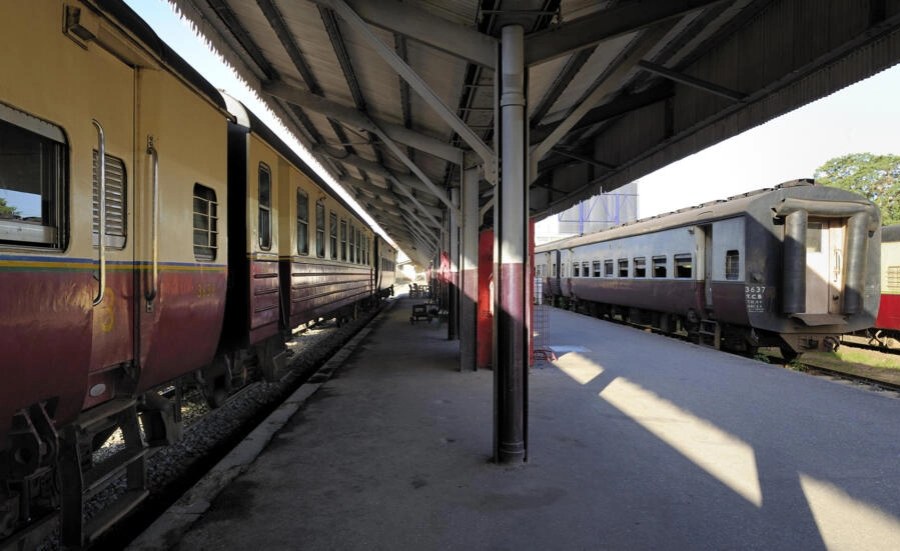Zanzibar seaweed growers seek research on disease affecting crop
Seaweed farmers have reported that their crops are under attack by diseases, prompting them to appeal to the government and other stakeholders to do researchContinue Reading
Seaweed farmers have reported that their crops are under attack by diseases, prompting them to appeal to the government and other stakeholders to do researchContinue Reading
The Kenyan Court of Appeal has declined to stop the reshipment of condemned rice to Zanzibar, where the consignment originated.Continue Reading
Mpango wa Tasaf Tanzania umesaidia kaya masikini kupitia ruzuku na vifaa vya kazi, kuwawezesha kuanzisha miradi ya kilimo na biashara.Continue Reading
Nestled in Zanzibar’s rich cultural tapestry, a trio of visionary photographers is reshaping global perceptions of this idyllic island.Continue Reading

The Standard Gauge Railway (SGR) train operations between Dar es Salaam, Morogoro and Dodoma will begin on Thursday next week as earlier planned, the Tanzania Railway Corporation (TRC) has announced.
The development came after the corporation officially launched the SGR operations from Dar es Salaam to Morogoro mid-June this year.
According to TRC Head of Communication Department Ms Jamila Mbarouk, the commencement of the SGR train services will bring changes to train schedules.
ALSO READ: Electric train poses little threat to air travel
She said the Express Train will depart from Dar es Salaam at 6:00am and leave Dodoma at 5:30am. The ordinary train from Dar es Salaam to Dodoma will depart the Capital City at 17:30 pm and leave Dar es Salaam at 18:55pm.
Ms Mbarouk detailed that the ordinary train from Dar es Salaam heading to Morogoro will leave at 9:30am and 16:00pm and depart Morogoro at 9:50am and 16:20pm.
SGR train tickets are available at ticket offices within SGR station buildings or through the online ticketing system available at https://sgrticket.trc.co.tz/.
During the official launch of Dar es Salaam – Morogoro route, passengers enjoyed a free ride after President Dr Samia Suluhu Hassan decided to provide free tickets to more than 1400 passengers.
Deputy Minister for Transport, David Kihenzile was among the first passengers in the first ever electric train in the country.
Mr Kihenzile said the Head of State ordered TRC to offer free service to all passengers who will use the service in the launching day.
The train started its journey from Dar es Salaam at 6:10 am and arrived at Morogoro main station at 7:56am covering 300kilometrers using only 1:45 hours.
Source: allafrica.com
Kenya is implementing measures to cut rice imports with the development of sustainable certified seed production system.
The country’s research body-Kenya Agricultural Livestock Research Organisation (KALRO) is pioneering the efforts in partnership with a Korean agency, which will ensure Kenya, which ships in up to 75 percent of the total rice requirement annually, cuts reliance on imports.
In a five-year collaboration with the Korea Partnership for Innovative Agriculture (KOPIA), the project will focus on the production of early-generation seed, the multiplication of elite varieties, and distribution to farmers.
The project will produce 5.8 tonnes of early-generation seed and 1,000 tonnes of certified Generation 1 seeds of high-yielding, climate-resilient varieties. Additionally, it will train 75 local technical experts, 10 experts in South Korea, and 210 farmers in quality rice seed production.
Speaking at the project launch in Mwea, KALRO Director General Eliud Kireger said Kenya’s domestic rice sector has failed to meet rising demand, a situation exacerbated by middle-class population growth and urbanisation.
“Rice consumption is increasing, especially among young people. With urban population expected to reach 50 percent by 2050, the demand for rice will significantly outpace supply,” said Kireger Dr Kireger.
Dr Kireger highlighted that the current per capita rice consumption is 28 kg per year, projected to rise to 30 kg by 2027, resulting in a demand of 1.8 million tonnes.

Get the latest in African news delivered straight to your inbox
Presently, Kenya consumes about 950,000 to one million tonnes annually but produces only 200,000 tonnes, creating an 80 percent deficit.
To address this, the government aims to achieve a 25 percent annual growth rate in rice production under its Bottom-Up Economic Transformation Agenda.
The DG expressed optimism that within four to five years, the project could reduce the deficit by up to 60 percent by improving access to high-yielding certified seeds.
KOPIA will contribute to rice research by introducing and commercialising Tongil rice varieties from the Korea Africa Food and Agriculture Cooperative Initiative (KAFACI), including ISRIZ 6, ISRIZ 7, and UKAFACI 39.
The project will also address mechanisation challenges faced by farmers, particularly in drying processes.
KOPIA Kenya Director Ji Gang Kim emphasised the importance of increasing rice self-sufficiency through new varieties, certified seed dissemination, and improved cultivation technology. He also highlighted the need for better drying and post-harvest management to ensure high-quality rice.
John Macharia, a rice farmer from Bura, Tana River, praised KALRO for addressing seed access challenges. “Since introducing the Komboka variety, we’ve improved our yields and eliminated brokers dictating prices,” he said.
KALRO and KOPIA have collaborated for over 15 years on projects including maize, indigenous chicken, potato, and sericulture. Currently, they are promoting chicken feeds containing black soldier fly larvae and rice by-products in Kenya.
Source: allafrica.com

Zanzibar — The Administration of Shandong Province of China has shown interest in investing in various development areas in the isles.
The delegation led by the Vice-Chairman of Shandong Province Mr Zhang Xinwen expressed the interest when they met President Hussein Mwinyi at the State House.
President Mwinyi invited the investors to invest in various areas including the blue economy sector.
“We still have many areas including opportunities in fishing, tourism, sea transport and agriculture and the government guarantees security and good environment of investing and doing business with improved infrastructures,” Dr Mwinyi said.
He explained that the people of Zanzibar are proud of the existing strong Zanzibar-China historical relation that has enabled medical personnel from China including Shandong province to serve in Zanzibar for many years.
“We thank China government and medical personnels for the ongoing support in improving healthcare in the Islands of Zanzibar, providing services in various hospitals,” said Dr Mwinyi as Mr Zhang utilised the opportunity to invite the Zanzibar President to visit the province.
ALSO READ: Mwinyi optimistic of US Congressional visit
President Mwinyi accepted the invitation to visit Shandong Province.
The Province Vice-Chairman thanked Zanzibar government and its people for the good reception, which further cements the relations.
“We will find areas to invest in blue economy and agriculture,” Mr Zhang said.
Meanwhile the Switzerland Ambassador to Tanzania, Mr Didier Chassot met Dr Mwinyi and discussed various issues including strengthening relationship between Switzerland and Zanzibar, according to a statement from the State House.
Source: allafrica.com
In a significant milestone of rural transformation, the Rural Energy Agency (REA) has successfully electrified 98 per cent of all villages across the country.
Such great stride in the energy sector is in line with the ruling party CCM’s 2020-2025 Election Manifesto, which directs the government to supply electricity to all streets and villages by 2025.
With one year ahead to the deadline, the sixth phase government under President Samia Suluhu Hassan is on track to beat the envisioned goal of connecting all villages with electricity infrastructure, which is critical in elevating citizens’ living standard.
The REA Director of Rural Electrification, Engineer Jones Olotu told the ‘Daily News’ in an exclusive interview in Dar es Salaam recently that as of July this year the power agency connected with electricity a total of 12,031 villages, equivalent to 98 per cent of all villages.
He said currently, only 287 villages are not connected with power, noting they will be connected to power in September this year.
He said that a total 8,247 villages had already been connected with electricity, equivalent to 66 per cent by 2020.
And, REA has been implementing a five years grand plan of electrifying the remaining 4,071 villages that would see all 12,318 villages countrywide linked with power by next year.
REA ambitious plan is aligned with the ruling party CCM’s Election Manifesto 2020-2025 and the Third National Five-Year Development Plan covering 2021/2022 to 2025/2026 (Third FYDP) that aims at guiding the country’s efforts towards the attainment of the Tanzania Development Vision 2025, all together intend on among others to achieve a middle-income, competitive and semi-industrialised economy with shared growth and high-quality human development.
“We are ahead of the manifesto as by September this year, which is before its time limit (2025), we are going to realise electrification of all villages,” Mr Olotu said.
He said availability of electricity in rural areas has been boosting citizens’ income by enabling them open new economic activities such as shops and kiosks, groceries, restaurants and hair cutting and beauty salons.
ALSO READ: PURA set to announce new oil, gas exploration opportunities
Furthermore, it improved domestic activities like lighting, charging phones and listening to radio, he said adding it also made life easier and more pleasurable by allowing businesses and kiosks to function even during the night hours.
On the other hand electricity supported children’s education by allowing them to study at night, he said and noted it enabled villagers to receive health services closer to their homes and at a lower cost.
The next step ahead, he said REA’s focus is to ensure electricity reaches all hamlets and households referring to the fact that presently, only 32, 827 hamlets equated at 51 per cent have power, while 31,532 others are yet to be connected.
He said the rural energy body has another five years electrification plan spanning from the current 2024/2025 Financial Year aiming at lighting 20,000 hamlets at a cost of about 6tri/-.
Mr Olotu detailed that REA projected to connect 4,000 hamlets per year. The country has a total of 64,359 hamlets.
“Up to now, we are undertaking procurements for implementation of the first batch within the current financial year. Few days to come, we will announce tenders for contractors to be located to specific hamlets,” he said.
Toward national wide households’ electrification, according to the Third FYDP, the country targets at ensuring 60 per cent of all households are connected with power by the end of 2025/2026 FY from 40 per cent lighted in 2021/2022.
He lauded the government for implementation of the Julius Nyerere Hydropower Plant (JNHPP) project that after its completion is expected to add 2,115 megawatts (MW) into the national grid, critical in stabilising electricity supply in the country and beyond.
In February 2024, the project injected 235MW into the national grid after a switching on of its ninth turbine that strengthened electricity availability both in urban and rural areas.
A villager, Mr Peter Nzema (30) based in Bukumbi village, Shinyanga Region commended the government for connecting their rural community with electricity.
He said their village was connected in 2023 ending over five decades of living in dark without electricity.
He said prior to being connected with electricity their village’s economic activities were paralysed with no any factory in comparison to now whereby a maize mill has been established by a local investor.
More significantly, he said the Bukumbi village experiences some sort of urbanisation, as a result of residents who take initiative to open up saloons and shops.
“It is just a beginning of transformation of the village that for so long time we used to dream one day to have electricity,” Mr Nzema said.
However, he noted that there is a slow pace in connecting the hamlets existing in their villages.
“It’s okay that the electricity has reached our village but the number of households connected remains less than 10, the power has not been distributed to our residential area as we hoped,” he said, adding “We are ready to pay.”
Mr Nzema told Daily news if REA starts to connect households in their village, it will enable small farmers including himself who choose to undertake irrigation especially in vegetable and fruit crops including tomatoes and water melon to scale up production.
“Small scale farmers who adopt irrigation are eager to see their households and hamlets are connected with electricity to get rid of using diesel powered generators, which make them incur high cost of production,” he said.
Reacting on the on-going rural electrification, Economist cum Investment Banker, Dr Hildebrand Shayo anticipated that the transformative move will directly affect, positively though, the commercial sector through the use of specific electrical appliances encompassing refrigerators.

Get the latest in African news delivered straight to your inbox
Furthermore, he said presence of electric lights will facilitate residents to extend working hours, subsequently propelling the country’s development.
“Electrification in rural areas may result in to increases in daytime working hours and noticeable increases in evening and night time working hour,” Dr Shayo said.
Dr Shayo said in his ongoing research on Economic Impact of Rural Electrification in Tanzania, he found that the number of shops per 1,000 people in electrified villages is 4.28, compared to 3.43 in nonelectrified villages, a roughly 25 per cent difference.
Regarding institutional development, he said that electrified villages in several case study areas have much greater levels of institutional development.
“I can assert that it dramatically improves the general standard of living in rural areas, lowers rural-urban migration, increases industrial and agricultural production, and produces more jobs” Dr Shayo remarked.
Ms Betty Mbuzi, a resident at Mwatulole Street in Geita Region said she was optimistic that electrification all villages in their region will catalyse mining activities involving artisanal miners in their region which is endowed with minerals.
She noted that lack of electricity in some villages while others are connected with it culminate into energy divide.
Source: allafrica.com
The new and promising data come nine months after Tanzania and Zambia agreed to address eight out of 24 trade challenges and put up plans to resolve the remaining 16 by December 31, 2023, to facilitate trade between the two countries effectively,Continue Reading
Tanzania’s Adrian Raphael Njau has been appointed acting EABC chief executive, replacing John Bosco Kalisa of Rwanda.Continue Reading
Zanzibar Investment News Tanzania Investors Ltd © 2025